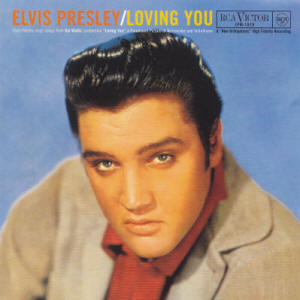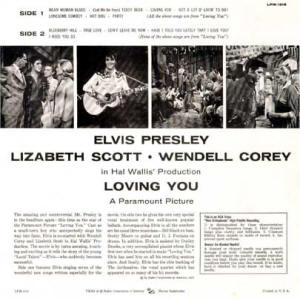Verdict
Elvis' third album was not just his shortest so far, but also the first with a noticeable amount of weaker tracks. However, it still includes several great ones and the mega-seller "Teddy Bear".
![]()
(C) RCA Records
The ultimate site about the king of the analogue age


The first album had been named "Elvis Presley", the second one was called "Elvis", so one might have expected a longplayer by the name of "Presley". Instead RCA Victor released the soundtrack of "Loving You", the second motion picture of the rock'n'roll king. The label started to ship the record on July 1, 1957, three weeks later it entered Billboard's "Pop Albums Chart". It had a run of 29 weeks with ten of them at the number one. The RIAA honored the domestic sales with a Gold Award in 1968. During its initial sales period RCA was able to retail 300,000 units, worldwide the sales of "Loving You" surpassed the 3 million mark. This amount of physical sales equals 450 million paid streams of the complete album or 4.5 billion paid streams of individual tracks. Undoubtedly "Loving You" was a success, but nobody failed to notice, that it sold worse than the previous longplayer, even though it was supported by a movie.
In 2016 the complete Presley catalogue was restored and remastered by Vic Anesini for a boxed set of 60 compact discs called "The Album Collection". Sony Music Entertainment provides the streaming platforms with the same versions of the individual albums (some of them offering bonus tracks), albeit in 24 bit/90 khz flac. That means, if the platform of your choice supports high resolution audio, you can enjoy the tracks in the same quality Sony used to scan and master them. On Spotify, which has a market share of approximately 30% and is the only platform that publishes streaming figures, "Loving You" accumulates 305 million streams and is requested 95,000 times per day. So once again the situation has changed compared to the good ole' days. Now "Loving You" is four times as popular as "Elvis".
The cover was made up with a promo photo for the accordant film. It was the first time, that Elvis was shown with black hair. He looks somewhat rebellious, which didn't just fit the charackter he portraied on the silver screen, but also matched his new image as the king of rock'n'roll. The backside included four further photos from the movie and liner notes.
The album has a running time of 26:23 minutes.
Because the movie didn't include enough songs to fill an album, the b-side of the longplayer was filled with studio recordings. During the soundtrack sessions Elvis re-recorded songs, that he had taped before. In these cases Steve Sholes used the original versions.
The soundtrack was recorded between January 15th and 18th, 1957 at the Paramount Soundstage in Hollywood/California. The sessions were produced by Walter Scharf and engineered by Phil Wisdom. The band consisted of Scotty Moore (guitar), Bill Black (bass), DJ Fontana (drums), Hilmer J. Timbrell (guitar), Dudley Brooks (piano) as well as Gordon Stoker (piano) and Hoyt Hawkins (piano). The harmony vocals were provided by The Jordanaires, that included, besides Stoker and Hawkins, Hugh Jarrett and Neal Matthews. Further sessions were held on January 21st and 22nd, 1957 at Radio Recorders in Hollywood/California. Walter Scharf booked the same musicians, but added George Fields (harmonica).
The tracks on the b-side were recorded on January 12th and 13th, 1957 at Radio Recorders in Hollywood/California. The sessions were produced by Steve Sholes and engineered by Thorne Nogar. Elvis' band consisted of Scotty Moore (guitar), Bill Black (bass), DJ Fontana (drums). The harmony vocals were provided by The Jordanaires. Further recordings were made on February 23rd and 24th. The former Blue Moon Boys were accompanied by pianist Dudley Brooks, at times Gordon Stoker played piano and Hoyt Hawkins played organ. The latter mentioned gentlemen belonged to The Jordanaires.
In 2006 Follow That Dream Records released a collector's edition of "Lovint You". Besides the tracks of the original album, this new version also included tracks, that at the time were available on singles only and some outtakes. For a review tap HERE.
Mean Woman Blues
Elvis recorded Claude Demetrius' song on January 13, 1957 at Radio Recorders and needed 14 attempts to do so. Jerry Lee Lewis covered "Mean Woman Blues" the same year, in 1963 Roy Orbison followed with another version. The combination of the ironic lyrics and the king's snotty performance is nothing but great and turns the 12 bar blues into a true highlight. The song was also released on the extended player "Loving You - Volume 2" (1957). Later it was included on the boxed set "The Other Sides - Worldwide Gold Award Hits Volume 2" (1971).
Teddy BearThe singer begs his loved one to be her Teddy Bear. Tigers are too rough and lions are not kind enough. For a performer, who was sold as a rebel and even the king of the wicked rock'n'roll music, lyrics like that were embarrassing. But the girls loved it and "Teddy Bear" became an evergreen. In the 1970s Elvis mostly performed it in a medley with "Don't Be Cruel". Live recordings can be found on "Elvis As Recorded At Madison Square Garden" (1972) and "Elvis In Concert" (1977). RCA Victor also released the studio recording on the single "Teddy Bear" / "Loving You" (1957), the extended player "Loving You - Volume 1" (1957) and on the boxed set "Worldwide 50 Gold Award Hits - Volume 1" (1970).
Loving YouIn June of 1957 "Loving You" was used on the b-side of "Teddy Bear". The track had also been released on the extended player "Loving You - Volume 1", in 1970 it would be re-issued on the boxed set "Worldwide 50 Gold Award Hits - Volume 1" and in 1975 on the album "Pure Gold". Elvis recorded the song on January 17, 1957 within three takes. Even though the last one was selected for release, the king re-recorded the ballad on February 24th and ordered RCA to release the 4th attempt. "Loving You" was written by Jerry Leiber and Mike Stoller. Elvis had previously recorded Leiber/Stoller songs, but this was the first one, the duo wrote exclusively for him.
Got A Lot O' Livin' To DoThe popular, but mediocre songs are followed by "Got A Lot O' Livin' To Do". In the future Ben Weisman would be responsible for a lot of meager movie tunes, but this one, written with the help of Aron Schroeder, is a masterpiece. On January 12, 1957 Elvis also put his best foot forward and delivered a perfect performance. In total he needed nine takes to get it right. RCA also released the track on the ep "Loving You - Volume 2" (1957) and the boxed set "The Other Sides - Worldwide Gold Award Hits Volume 2" (1971).
Lonesome CowboyThis song re-appeard on the same records. "Lonesome Cowboy" was written by Sid Tepper and Roy C. Bennett, who would also become regular suppliers of movie tunes. I don't like this song too much and Elvis seems to be a bit overstrained with the tune. On January 15, 1957 he recorded 25 takes of the dramatic ballad, but didn't archive a releasable performance. Finally the master was spliced of the takes 25 and 20.
Hot DogJerry Leiber and Mike Stoller had written "Hot Dog" for Young Jessie, who also recorded it. But because the track was never released, Elvis' version can be regarded to be the original one. He taped the song on January 18, 1957 within 17 takes. It's a nice enough song, but certainly not a hit. "Hot Dog" can also be found on the ep "Loving You - Volume 2" (1957) and on the boxed set "The Other Sides - Worldwide Gold Award Hits Volume 2".
(Let's Have A) PartyOn January 21, 1957 Elvis needed 11 takes to deliver a perfect version of Jesse Mae Robinson's "(Let's Have A) Party". A few days after the release on this album, RCA also issued the song on the extended player "Loving You - Volume 1". Even though Elvis was the first to cut this song, the public connects it to Wanda Jackson, who covered "(Let's Have A) Party" three years later and released it on a single.
Blueberry HillOn January 19, 1957 Elvis covered Fats Domino, who had stormed the charts with "Blueberry Hill" the previous year. But even then it was an old song, originally recorded by The Sammy Kaye Orchestra & Tony Ryan way back in 1940. The music was composed by Vincent Rose, the lyrics were written by Larry Stock and Al Lewis. Elvis needed nine takes to record the song. He sings it well, but not as well as Fats Domino. The studio recording was re-released on the extended player "Just For You" (1957), a live version can be found on the album "Elvis As Recorded Live On Stage In Memphis" (1974).
True LoveBack in 1957 many people might have been surprised to hear the newly crowned rock'n'roll king sing a Cole Porter song. The original version had been recorded by Bing Crosbiy and Grace Kelly (who just sang a few words) and became Crosby's 21st Gold Record. Elvis taped "True Love" on February 23, 1957 at Radio Recorders within 20 takes. Even though I don't like many of the king's early ballads, I certainly appreciate this one. Especially the harmonizing between Elvis and The Jordanaires is great.
Don't Leave Me NowThe king taped "Don't Leave Me Now" on February 23, 1957 at Radio Recorders. It wasn't an easy task for him, because he needed 29 takes to archive a releasable performance. Even though he approved the inclusion of the song, he later re-recorded it for the movie "Jailhouse Rock" and had this second version released on the accordant soundtrack ep.
Have I Told You Lately That I Love YouIn 1944 Lulu Bell & Scotty had recorded the song for a movie, but it took two years until it was released on a record. Later it was covered by Red Foley, Tex Ritter and The Songs Of The Pioneers. Elvis taped his version on January 19, 1957 at Radio Recorders, take number 15 became the master. RCA later also released the track on the extended player "Just For You" (1957). It's a nice popsong, but it doesn't stay with you.
I Need You SoThe same ep included "I Need You So". The ballad was written by Ivory Joe Hunter, who was also the first to record it. On February 23, 1957 Elvis taped "I Need You So" within eight takes. It's also no highlight, but certainly nice enough.
Elvis' third album was not just his shortest so far, but also the first with a noticeable amount of weaker tracks. However, it still includes several great ones and the mega-seller "Teddy Bear".
![]()
(C) RCA Records